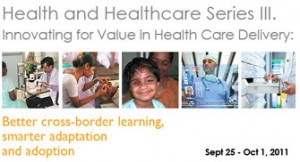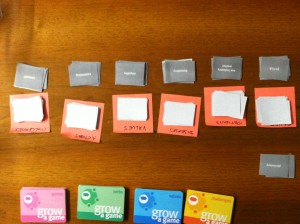What’s happening in Salzburg in September, you ask?
The Salzburg Global Seminar Session #468
Innovating for Value in Health Care Delivery:
Better cross-border learning, smarter adaptation and adoption

Salzburg Global Seminars, a non-profit organization that holds seminars on a variety of worldwide obstacles for humanity, was established in 1947, shortly after World War II in an effort to unite international leaders to solve issues of global concern.
Among the 12 faculty members putting on these seminars are the Co-chairs, Director of the Dartmouth Center for Health Care Delivery Science, Dr. Al Mulley, and Dr. Agnes Binagwaho, Rwanda’s Minister of Health. Other faculty includes Dartmouth College’s own President Jim Yong Kim, and Tiltfactor‘s Dr. Mary Flanagan. Attendees range from public health officials, journalists, entrepreneurs, non-profit health groups, to UN and Human Rights workers. People come out from all over the public and political spectrum to tackle familiar problems in different ways.
Mary Flanagan, Director of Tiltfactor Laboratory, has been invited to host a workshop at this conference in an effort to revolutionize the way people think about health care systems. At this conference, Flanagan, along with her fearless Tilt intern, Max Seidman, student designer on POX: SAVE THE PEOPLE, will teach over 60 public health officials how to design games designed to positively affect global health.
When asked what the role of these games at this workshop would be, Flanagan responded:
“Our goal is to use games to facilitate innovative thinking about global health challenges. Tiltfactor’s ethos in creating collaborative, cooperative play scenarios — what we call collaborative strategy — can have a great deal of impact in helping those in public health rethink how their systems are working, and innovate.”
But what good would a game design workshop be without Grow-A-Game? Grow-A-Game is a concept and brainstorming tool created by Flanagan and her team to aid game designers in getting out of any game-design ruts they may have walked into. In the wake of the Tilt Team’s travel, back at the lab, we have designed an edition of Grow-A-Game specifically for this conference, nick-named “Grow-A-Global-Health-Game”.
The new Grow-a-Global-Health-Game pack consists of the following categories:
Verbs – the good ol’ verbs deck. Now it’s full of verbs like “sanitizing”, “distributing”, and “preventing”.
Challenges – This deck includes environmental situations that can challenge health care delivery, such as corrupt government, unsafe water, genocide, social stigma — basically anything standing in the way between the patient and the treatment.
Values – The values that can motivate anyone to focus their time and energy on these subjects, really. Sharing, tolerance, humility, peace, and altruism are just a few of the many.
Games – This deck was especially interesting and thought provoking. When constructing this deck, we had to keep in mind that those attending the seminar would be physically modding the games we listed in this deck at the workshop — so we had to comb through them very carefully, given that some of the games in the original decks were largely unheard of in the regions we are targeting, as well as virtually unmodifiable for this specific purpose.
The NEW categories:
Diseases – Everything from malaria to dysentery to HIV/AIDS. If you’re a disease, we’re coming after you!
Patients – This deck contains a broad spectrum of potential patients including but not limited to homeless children, the impoverished, single mothers, and sex-industry workers.
Play can be something very underrated for creating new solutions to big problems. In the midst of all of the obstacles they face, I have no doubt that these leaders can get the creative juices flowing and get down and start “Playing for Change!”



